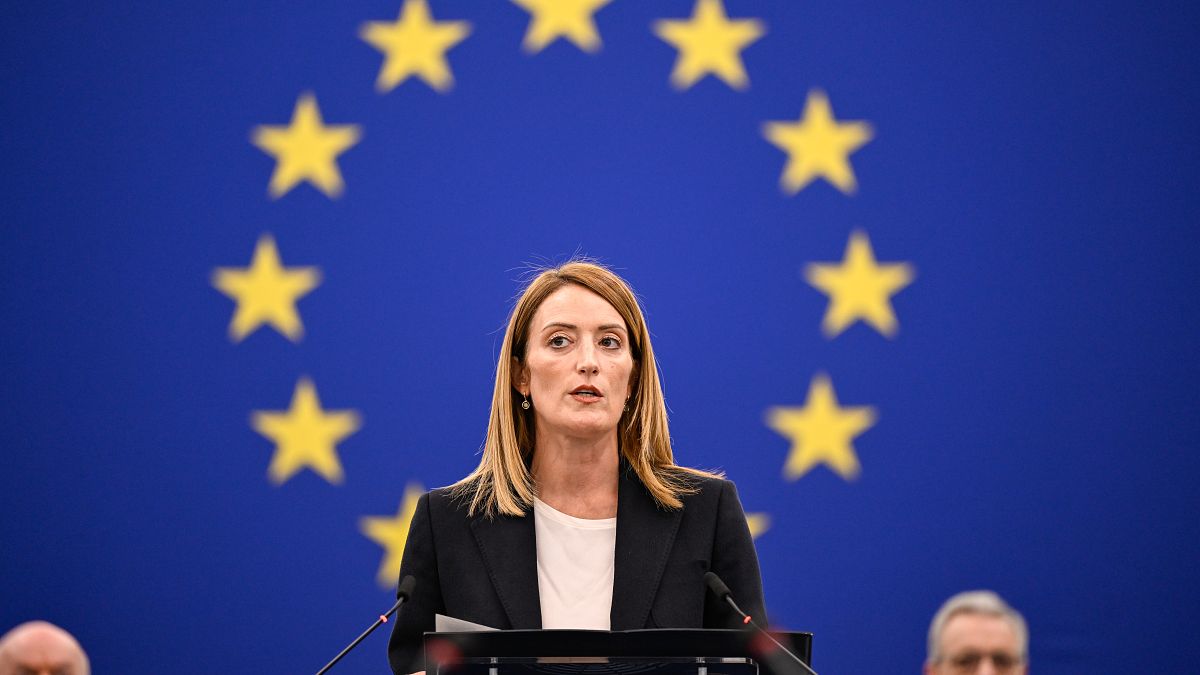The European Parliament is in for a busy week in Strasbourg, with key issues like the budget, migration, Ukraine, and conflicts in the Middle East set to dominate discussions. Expect fiery debates among MEPs, along with the presentation of two major awards for human rights and journalism.
Financial aid for Ukraine, the situation in Gaza and Lebanon, the EU budget for 2025 and the latest developments on how to approach migration policy at EU level are all features of a packed agenda as MEPs head to Strasbourg this Monday for the second plenary session of the month.
On Monday evening, Parliament President Roberta Metsola will open the four-day session with a speech on the International Day for the Eradication of Poverty, followed by an address from former Italian Prime Minister Enrico Letta and a debate on how to strengthen the EU’s single market.
According to the latest figures from Eurostat, 21.4% of the bloc’s population [equivalent to 94.6 million people] were at risk of poverty or social exclusion last year. The highest rates were recorded in Romania (32%), Bulgaria (30%) and Spain (26.5%).
The EU’s €35bn financial support for Ukraine, as part of a G7 plan to provide a €50bn loan to meet the needs of the war-torn country, and the escalation of the conflict in Lebanon will instead dominate Tuesday’s agenda.
Far-right forces are expected to be split on the question of whether to continue supporting Ukraine against Russia’s military aggression, with a likely division between Viktor Orbán’s Fidesz MEPs, who oppose the loan to Zelenskyy’s country, and the likes of France’s Jordan Bardella and Spain’s Jorge Buxadé and their delegations, several parliamentary sources told Euronews.
On Tuesday, the 2025 EU budget will also be a major focus, with a final vote on the Parliament’s position scheduled for Wednesday. MEPs are pushing back against the Council’s proposal to cut €1.52 billion from key EU programs like Horizon Europe and Erasmus+, and are advocating for more funds to address health, youth, agriculture and humanitarian challenges.
Meanwhile, Wednesday will be packed with debates on migration, competitiveness, Poland’s abortion law and the continuing war crimes of the Russian Federation – but also with the award of the Daphne Caruana Galizia prize for journalism and a vote on a resolution to revise the medical devices regulation.
Following a summit of EU leaders in Brussels last Thursday, migration will remain a particularly hot topic in this session, with parliament’s political families also divided on how to handle common migration policy.
“Our approach to asylum must be designed around the nuances and complexities that Europe faces, while maintaining human rights and protections for those fleeing war and persecution,” MEP Bas Eickhout (The Netherlands/Greens) said after last week’s summit.
But others, mainly right-wing forces, are welcoming the discussion on new ‘innovative solutions’ to curb irregular migration.
Lastly on Thursday, the winner of Parliament’s top human rights prize is due to be announced, and MEPs will vote on the situation in Azerbaijan and tensions between China and Taiwan.

